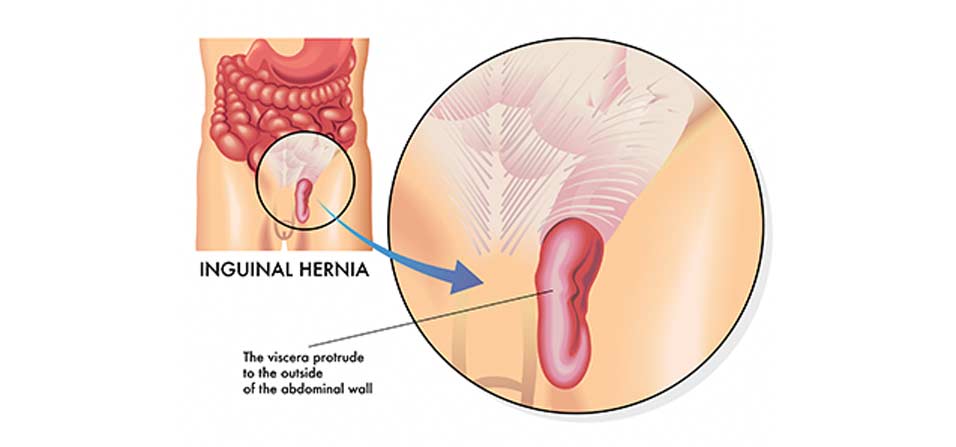
A hernia occurs when a portion of an internal organ or other tissue protrudes through surrounding muscle or tissue structures.
Inguinal hernias are one of many types of hernias that are characterized by the structures through which they protrude. In the case of inguinal hernias, a portion of the patient’s intestines protrude through either their right or left inguinal canal.
The inguinal canals are located in the groin and lower abdomen. These canals house the spermatic cords in men and the round ligament of the uterus in women.
CONTACT US TODAY
What Causes Them?
It isn’t often definitively known what causes any type of hernia, and this fact holds true with inguinal hernias. However, there are some patterns that have helped determine risk factors. For example, men are much more likely to experience inguinal hernias than women are. This is likely due to the fact that men have larger inguinal canals when compared to those of women. It is suspected that some people develop with a weak point in their abdominal wall that makes them more likely to experience this type of hernia. Additionally, activities or events that increase the patient’s abdominal pressure can cause these hernias to appear. Things that can increase abdominal pressure include certain medical conditions, some abdominal surgeries and pregnancy. Activities such as excessive coughing, straining during a bowel movement, or heavy lifting may also result in abdominal strain that can lead to inguinal hernias. Family history is also considered a risk factor for this specific type of hernia.

What Are The Symptoms?
Most of the symptoms of inguinal hernias are relatively mild, and many patients don’t experience any symptoms at all. The main symptom of inguinal hernias is a lump that appears either on the left or right side of the pubic bone. This lump is often only apparent when the patient is standing and the patient should be able to push it back in when they are laying down. This lump may be tender to the touch, cause the patient discomfort or pain, or cause pressure in the groin. If an inguinal hernia grows, it may expand into surrounding tissues. In men, this can include expansion into the scrotum which often comes with pain and swelling. Inguinal hernias can also get stuck in the out position, which is referred to as an incarcerated hernia. This means that the affected part of the bowel has only a limited blood supply. If this occurs the patient may experience nausea, vomiting, and inability to have a bowel movement. Strangulation of the hernia can also occur and means that the circulation to the effected portion of the bowel is entirely cut off. This is considered a medical emergency that requires immediate intervention because the tissue can die.
Are There Restrictions After Surgery?
After your hernia is repaired, you want to avoid any heavy lifting for the first couple weeks. Straining your bowels can also weaken or rupture the repair, so your doctor will also recommend that you take a stool softener for the first week or so. Depending on your physician’s recommendations, you may have to avoid intercourse for a limited time period.
The risks for this type of surgery are the same as most other surgeries, including bleeding and infection. There is also a risk of the stitches not holding together if the surgeon chose to stitch the area. If mesh is inserted, there is a risk of your body rejecting the mesh tissue or it causing an allergic reaction. In these instances, the mesh will have to be removed and stitches used instead.
If you think you have an incisional hernia, be sure to get it checked out by your doctor. Not all hernias require surgery, but you want to take care of it sooner rather than later so it does not get larger.

How Are Inguinal Hernias Treated?
Hernias won’t go away on their own but many don’t cause any symptoms and won’t require any treatment. If the hernia does require treatment, the physician will recommend surgery to reposition the intestines with surgical mesh.

